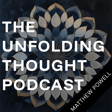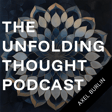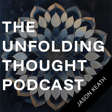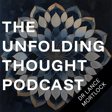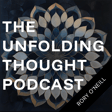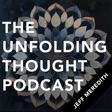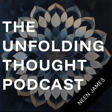Become a Creator today!Start creating today - Share your story with the world!
Start for free
00:00:00
00:00:01

Tara Hamberger: Building AI-Powered Support for Family Caregivers
In this episode of The Unfolding Thought Podcast, Eric Pratum speaks with Tara Hamberger, founder and CEO of RootedCare+, about her mission to provide 24/7, text-based support to unpaid family caregivers.
Tara shares the personal caregiving experiences that led her to launch RootedCare+, why she chose SMS over apps, and how Roo, their compassionate AI assistant, delivers emotional support, resource guidance, and even microgrants. She explains the challenges of designing AI for empathy, the importance of accessibility in tech for caregivers, and how RootedCare+’s funding model directly fuels aid for those who need it most.
Topics Explored:
- How personal caregiving challenges shaped the creation of RootedCare+
- Designing emotionally intelligent AI that can respond in real time
- Why SMS can be the most accessible tech for overstretched caregivers
- The role of microgrants in preventing burnout and sustaining care
- Building a social enterprise that reinvests in the community it serves
Links:
- Connect with Tara on LinkedIn: https://www.linkedin.com/in/taraliana/
- Learn more about RootedCare+: https://rootedcare.plus
- Study on poverty impeding cognitive function: https://www.science.org/doi/10.1126/science.1238041
- Check out the discussion with Juli Rush about grief and the death of the future: https://unfoldingthought.com/21-juli-rush-foresight-grief-and-the-courage-to-let-futures-end/
Have a recommendation? A question? Contact Eric: eric@inboundandagile.com
Transcript
00:00:03
Speaker
Tara, thank you for joining me. We've known each other for so long and i respect to you so much as a colleague and a friend that I'm really glad that you're here. going to ask something that I think is most relevant to perhaps your background and also what you're doing right now.
00:00:21
Speaker
So you've been career-long digital marketer, and I think in the last decade or so, you've also been an agency owner, and now you've started a new venture around supporting caregivers, I believe family caregivers most often. So can you tell me what led you to starting this new project?
00:00:46
Speaker
Yeah, absolutely. um First, thank you, Eric, for inviting me. This is this is really exciting. I've followed you since you started. So this is awesome. um But ah yeah, my background expands from digital marketing, technology, analytics, development, all the things.
00:01:04
Speaker
um But first and foremost, in the past five years, I'm i'm a caregiver. That's something that I've lived and held for silently for the past five years, unless, you know, you and i you know, we have a close relationship, family and friends, things like that.
00:01:21
Speaker
But that's been the role and the hat that I've kind of lived within that time span. ban um and with caregiving, there's a shift in time. You go through the newness of it, the middle part, the end part, all of the things.
00:01:36
Speaker
So now I have the time. I have the capability, the capacity. And I recently um was grieving, but not my grandmother. She's still with caregiving. with this, but my dog.
00:01:48
Speaker
And I was grieving in that instance. And it took me back to when I first became a caregiver, um just being lost, um needing help, needing support. Am I making the right decisions?
00:01:59
Speaker
And that kind of just sparked the fire, the flame of where I am now with Rudacare Plus, creating a tool that helps family caregivers, unpaid family caregivers specifically.
00:02:14
Speaker
I think I hear you saying some things that I have heard a lot from people who support folks that are homebound, you know, whether they're family sort of unpaid caregivers themselves or they are physical therapists or whatever that are going into people's homes, whether they're doing physical therapy or wound care, who knows what.
00:02:40
Speaker
I think I hear you saying that Okay, so your dog passed after being with you for quite a long time and you experienced the grief of that.
00:02:56
Speaker
Maybe you felt lost or alone or you didn't exactly know how to handle that regardless of whatever support system you had.
00:03:09
Speaker
But then also, couldn't think I can assume that you mentioned your grandmother, that when you are a caregiver, you probably also experienced that there's often too much work to do.
00:03:29
Speaker
it's quite a burden, not in the sense, of course, that you want your family member to be ah described as a burden per se, but like there's not enough time in the day there.
00:03:43
Speaker
You know, if you have someone who has dementia or something like that, they require just constant attention. You aren't able to get out as much and communicate with people who are dealing with similar things or have been through that. And so Even if some of the specifics are not correct, I think that I hear you saying that you've now started a business or you have a product that aims to support people it with their grief, with feeling alone, not knowing what to do and so on. Is that right?
00:04:20
Speaker
Yes, absolutely. And you pretty much hit the nail on the head. Grief and the ah the quickness of caring for a loved one, whether that's an adult child that may have a disability, um an elder, your parents or whatnot, or even children, there's still correlation of um a difference in time.
00:04:43
Speaker
a difference in who you used to be versus who you are now. So grieving um in the sense of, did I make the right decisions? Like, could is there something that I could have done better?
00:04:55
Speaker
In caregiving, am I making the right decisions? Is there something that I can do to make my loved one more comfortable? And so going through that process, took me back to the initial instance of me becoming a caregiver.
00:05:08
Speaker
Because we don't say I'm a caregiver, I'm taking on this role. It's kind of just put on you, whatever climate it may be. um And so I built a tool to allow caregivers to get back to them.
00:05:21
Speaker
We can't pour from an empty cup. We can't ah look after the ones that we love if we're not at 100%. But sometimes we're just, we we're we're propelled in this new situation that we forget who we used to be,
00:05:38
Speaker
that allowed us to be capable and blessed enough to be in the current caregiving situation that we're in. So the tool is AI-powered. It's all SMF.
00:05:48
Speaker
No apps, no dashboards, no login. And it allows, it it is powered to be emotionally aware, to understand sentiment, to understand Be there for the caregiver when they feel like they're alone.
00:06:04
Speaker
During the times where they can't reach anybody on the phone or they don't want to feel like a burden. You mentioned, you know, you've you You know, like you now you have this loved one caring for you and you understand what being a burden could feel like. So you don't want to say, hey, I'm exhausted today. So you don't want to be a burden to anyone else.
00:06:24
Speaker
So this tool um allows people to just let it out, release it so they can get back to having um those human connections as well as finding new resources. It provides local resources based off their zip code.
00:06:39
Speaker
um It also provides financial assistance. The goal for Rooted Care Plus is to be a holistic um supporter for the supporters, not just not just one avenue, not just here's a resource, call them, go figure it out.
00:06:56
Speaker
Or here's a resource. Dang, that answer in the phone. um It guides them through the questions they could ask when they call that resource. It um asks them questions on what makes you happy. If it's music, let's create a playlist together.
00:07:11
Speaker
Let's take like five minutes to see if we can get you back to 50%. So you could care for your loved one. Or let's see if there's some respite care options in your area. And these are the questions to ask to make it convenient for you.
00:07:24
Speaker
So it's a tool that puts the caregiver first, finally, versus the caregiver just being additive to the person receiving care. I think if I'm hearing you correctly, the support that a caregiver might get is often either secondary to the support of the person who is getting care and or it is just you know kind of tied to that
00:07:57
Speaker
person that needs care, them getting support, you know? So someone in order for you to just maybe have somebody to talk to when you don't have anyone to talk to, it kind of requires that, I don't know, your insurance has approved that your grandmother can get some level of care as well. And if your insurance doesn't approve that, then you Tara as the caregiver are not going to get someone to talk to if that's what you need.
00:08:27
Speaker
Right. Absolutely. it's ah It's a, it's a, there's care teams, you know, you have your loved ones being part of your care team, your healthcare provider, things like that.
00:08:38
Speaker
um Even if you look at the stats and the numbers of depression from therapists or doctors, people in high stress workplaces,
00:08:49
Speaker
Um, it's a, it's a level of, um, they're caring, they're givers, they're caring for others, but they have insurance. They have, um, uh, uh, resources within their workplace to get them the therapy they need or time off, things like that.
00:09:06
Speaker
Being an unpaid family caregiver, you don't have that luxury, not I don't want to say luxury, um but you don't Yeah, you could say luxury. You don't have that flexibility to be able to Take a step back. Like you can't take a step back because there's nobody else.
00:09:24
Speaker
Even if your loved one's going into adult daycare center or assisted living, there's always still the stressors of what do I do? And healthcare providers, they do amazing work. They do amazing job, but especially trying to include the care team, which is the family members um for the person receiving care.
00:09:41
Speaker
But their still primary objective is their patient who is not the caregiver. And so there's moments and times where Outside of the nine to five, there's the unknown.
00:09:55
Speaker
There's the newness of what just happened. Like my grandmother, she has dementia. What is this? I don't know what I can't call anybody. Nobody's available. Or, you know, my other family member, they're not showing up and they told me they would show up.
00:10:10
Speaker
I'm pissed at this point. But I can't talk to my grandmother and I can't talk to my, so what do I do? And that that holds in.
00:10:21
Speaker
And that is like, who am I? I'm disappearing. Because nobody is checking in on the person that is providing the care, but they are the strongest. They tend to be the strongest people in the family, um especially, or even if there's like four siblings, there's always one that steps in.
00:10:38
Speaker
But who is stepping in for that one? And that's what I wanted to create because I remember vividly when um I was taking Nana to the doctor's office and it was so bad. It was one of those things that I didn't know my grandma at that point.
00:10:56
Speaker
You know, I saw ah different person. My Nana is my ace. I saw a different person and I bawled. The doctor allowed me to just release it.
00:11:09
Speaker
She gave me a hug. She gave me that was the first time another ah doctor gave me that embrace to say, it's OK. What else can we do? That was the first time out of many appointments that someone just said, but I had to break down for it to get to that point.
00:11:25
Speaker
And caregivers shouldn't have to break down to get that additional aid for them and that additional guidance. um There are some amazing providers out there that ah step in to provide that emotional support, but they're only one person helping many.
00:11:43
Speaker
Whereas, an AI-powered tool right on text message can at least help someone not get to that stress point, but carry them to when they can have that one-on-one conversation with someone.
00:11:58
Speaker
um And that's that's that that's the beauty of Rue by Rue to Care Plus. I love it. Because then it also can understand based off of the conversation if someone is financially strapped this month.
00:12:11
Speaker
ah as we know with ah Medicaid and Medicare and the climate of things and the defundment and all of that, ah those little $50 here, $100 here, $200 can help.
00:12:25
Speaker
And it will help greatly, especially with the cost of everything going up. But Rue can understand like, hey, maybe a micro grant will help you this month. Just answer these three to four questions, no questions asked, and boom, the only thing we require is that they're a subscriber.
00:12:40
Speaker
That's it And it's one of those that we're looking out for people holistically. I don't care what they use the money for. Because sometimes you just need to, you know, get a day respite care so you could take a break and go to the spa to get back to hundred.
00:12:58
Speaker
Can you describe ah situation, you know, common situation, average or not, you know, whatever, a common situation that someone might find themselves in and then how they would begin using your service and what they would experience?
00:13:16
Speaker
Yes, absolutely. So um me being a marketer and a data person had to test to see how to get people because it's a new it's a new um channel in a sense.
00:13:29
Speaker
ah Well, text message isn't new, but to have AI directly plugged into text message without having to install an app, things like that, that's new. um Because you want to make sure it's not looked at as spam or something that's going to obstruct your privacy, things like that. So Ruth starts the conversation.
00:13:50
Speaker
Someone will register either through the website or um an organization through their local area agency on aging or their local um adult daycare center, or something like that. They will have that initial consent of scan this QR code.
00:14:08
Speaker
Consent X, Y, and Z. And Rue begins the conversation. Rue is saying, hey, I'm Rue by Rue to Care Plus. I'm here to help you on your caregiving journey. You can um vent.
00:14:20
Speaker
You can ask for local resources. You can ask for microgrants. And this is how it works. First initial is a little hesitant, like, whoa, what is this?
00:14:31
Speaker
Who are you? So I've had some ah conversations or seen some conversations in ah the data where they're like, who are you? Where'd you come from? But sometimes people don't understand what they're kind of agreeing to.
00:14:46
Speaker
And our first users originally came from Meta and Instagram where they hand raisers. Yes, I love this. Let's do it. But Rue started the conversation. And Rue was like, hey, I'm your caregiver, a support companion, blah, blah, blah, and text him.
00:15:01
Speaker
And some people like, okay. But here's the thing. The thing and the beauty of Rue is it checks in. So if the first conversation, it's like, who are you? I don't know. I'm not going to text back.
00:15:13
Speaker
But it checks in. It's like, how are you doing today, Eric? based off of, you know, caregiving can be really tough. are you How are you doing? We're not asking about the person they're giving care to. We're not asking about what happened like X, y and Z or a medication or health related. it We're just asking them simply, how are you doing?
00:15:33
Speaker
And that's a question that people do not get or hear often as they should, especially being a caregiver. So that sparks the conversation. As soon as that conversation um message from Rue, just checking in, especially if they didn't engage initially.
00:15:48
Speaker
It's a simple, how are you doing? I'm here for you. How was your evening? How was your morning? That type of thing. And that gets people engaged. And so they start opening up. um A person will say, you know what, Rue, last night was good.
00:16:02
Speaker
um I'm doing okay. I appreciate you checking in. And Rue will respond, you know, I'm glad to hear that. I'm glad that, you know, you're not letting whatever could be going on in your world affect your mood today. That is beautiful.
00:16:17
Speaker
I am here whenever you need to talk further. And so what happens is they keep the conversation and say, you know what? Thank you just for checking it. And then that's when they start opening up. um It's just like ah it's built to have therapy like training without being a therapist.
00:16:33
Speaker
It's built to be a friend and companion or someone that really cares for the caregiver. Its overall objective is that caregiver in that text. So people start opening up just by a simple question of how are you doing?
00:16:48
Speaker
And that is something that they don't hear. And even when you think on a one-to-one situation, i mean, Eric, you do it well. You text and you say, how's it going?
00:17:00
Speaker
And you do it consistently. And even one of those things is just like, you know what? I'm doing good. Let's talk. And we just start talking, opening up. And that's the same thing that Rue does.
00:17:11
Speaker
um And that's like an example of one question. Another one be like, hey, how are you doing? They may respond the next day and like, you know what? Last night was rough, but I really appreciate you checking in You know, I really had a rough time with X, Y and Z. I could really use some local resource. Or Rue would say, would it help if you I guided you to a local resource that could help you get some rest or take a break. So it guides them where they may not think that that's an option or a solution for them.
00:17:43
Speaker
Based off of the conversation, it'll say, you know what, let's see if there's some local resources in your area to see if we can help with groceries this month or something like that. And that's the beauty of AI, um where it could do...
00:18:00
Speaker
kind of superhuman things to get them back to the human. Does that make sense? Like yeah it can it can realize past conversations.
00:18:11
Speaker
um i built That was the most challenging thing. The caregiving memory threading is what I call it, um where it remembers past conversations. So when it does do that next check-in, it's like, hey, I know we talked about calling the VA for additional, you know, insurance. How did that call go?
00:18:31
Speaker
So it's following up specifically on that caregiver. So it really is like having chat GPT writing their messages where they don't even have to know about prompting. They're just having a conversation.
00:18:43
Speaker
And AI can pick that up to be able to prompt and respond accordingly in a compassionate way. And that's Rue. Was there a motivator, a specific motivator around including micro grants? Because it seems to me like that could have been a phase two or three, but it's in there right from the start is what it sounds like.
00:19:03
Speaker
Yes, it is in there right from the start. We actually just launched our micro grants in August. um we We launched June 27th. So it is there from the start because I want to be able to let the caregiver know we're here for for them from the start.
00:19:24
Speaker
But also... It's based off of the bank that we have as well. 30% to 40% of every subscription goes back to Rudicare Gives, which is the nonprofit arm of Rudicare Plus.
00:19:37
Speaker
That's the piece that distributes the microgrants to our subscribers. And then 80%, the reason why I wanted to have a um nonprofit is because if we get grants or when we get grants and donations, 80% goes back to the subscribers.
00:19:55
Speaker
A bigger bank, no matter the size of our caregiver audience, more can go and feed back into that community. um But I wanted to start it from the beginning because I want them to understand that we're here.
00:20:08
Speaker
And it's one of those that they may come initially for Resources. And then, okay, I'm good on the resource. But then it's like Rue follows up just to check in and be like, you know what? I really did need that check in.
00:20:22
Speaker
And then it's like, okay, check-in, resources. Dang, I'm strapped. And it's like, you know what? I sense that you're strapped. Here's $50 or here's $100 or here's based off of the conversation.
00:20:34
Speaker
So holistically, based off of my journey of what I went through as a caregiver and what other people are going through actively as a caregiver, what did I need in that moment, in that instance?
00:20:47
Speaker
Initially, I was going to make the micro grants for urgent needs. But urgent is subjective to whomever. And urgent is definitely subjective when it comes to someone's well-being and mental health.
00:21:02
Speaker
Because if we only did it based off of urgent, then we would be focusing primarily on the person we're giving care to and not necessarily... the caregiver, because urgent for the person giving maybe medication, maybe, um you know, transportation or ah hospital bills, things like that for the person we're giving care to.
00:21:27
Speaker
But when you think about respite care and taking a break and looking after respite care, allows the caregiver to take a break. That's what we're focusing on back to our overall mission and objective is the person who's providing that care. So I didn't want to make it urgent anymore.
00:21:44
Speaker
And I spoke to a couple of caregivers and they was like, what if they need to just, you know, go get their nails done? And I was like, yes, because I want to go. And that takes me to a centered ground, you know.
00:21:54
Speaker
I don't care. We don't care. um Because if they can have these moments of ah respite for themselves, these moments of calm for themselves, they can be back to, you know what?
00:22:07
Speaker
I'm ready for whatever happens, whether it's sundowners or something else that comes along the way. um So I wanted it to be from the beginning where they could see the growth of their life kind of their relationship with Rooted Care Plus, and as well as letting other people know, their family members know that they have this option, and to provide another option and another solution.
00:22:38
Speaker
We have AAAs, we have state and federal ah agencies and organizations that provide respite grants and things like that. So, Rue also guides them and directs them to that as well.
00:22:52
Speaker
But I wanted an option that was less difficult to get or quicker. that's ah That's a better word. Quicker to get. Because sometimes it could take a long time to actually get that respite care.
00:23:06
Speaker
Yeah. You reminded me of something that I think is quite common for caregivers, but maybe hard to imagine for people that have either never been a caregiver or you know, you haven't been close enough to someone else to realize this. And I won't name names because I don't know how much they might want to have shared, but someone that I know is taking care their family
00:23:41
Speaker
parent and then of course the spouse is taking care of their mother-in-law in this case and they were describing how when they had children and they you know young children and they needed to go to the bathroom or whatever And if the door was closed, but not locked, you know, the two year old or whatever it is would come and just open the door and you're there going to the bathroom. If the door was locked, then you start getting a bunch of knocking and what's going on in there. Typically mommy, but sometimes daddy, right?
00:24:18
Speaker
And how now taking care of the parent and you know the mother, the mother-in-law, depending on which spouse it is, that there is a very similar aspect, except for the fact that rarely does the two or three-year-old get confused and then you know Maybe younger children might become afraid. you know They have anxiety or whatever.
00:24:45
Speaker
But that's often not quite as big of an issue as if you have a 75-year-old who is now afraid that they... It's not just that they don't recognize you sometimes, yeah but also that you know, the one person that they didn't know, they don't recognize that Tara is their granddaughter, for example, right but they do become comfortable with you very often. You know, like, I don't know who you are, but there's something deep down about I'm safe with you.
00:25:18
Speaker
So not only do they perhaps not recognize you, but then also it's almost like when you leave, they don't know where you are. They have no conception of where you might've gone.
00:25:30
Speaker
And maybe they get up and they fall and they break their hip. In addition to that, they're more physically capable if they're not going to break their hip that they start causing problems. And I share this too long story but or example because...
00:25:48
Speaker
When year you haven't been through it or you don't have a sibling who's doing it or a good friend, then I think it's hard to imagine how much that puts on you that like in the case of going to the bathroom, I don't know, do you have to tie your mother-in-law down so she can't get up and break her hip coming to look for you?
00:26:10
Speaker
Or do you have to leave the bathroom door open so that while you're going to the bathroom, your 75-year-old mother-in-law can just walk in on you, you know, one adult on another. And then whatever it is, however it is that you handle that solution, and it's probably going to evolve over time depending on your circumstances, right who else do you know that's dealing with that?
00:26:33
Speaker
Right. And right and you, I suspect you would tell me that human connection is having a community is very important, but it seems to me like as much as there is a threat with AI, AI companions, whatever, becoming like, you know, the movie Her, where he falls in love with and dates who Scarlett Johansson, I think is the voice.
00:27:01
Speaker
Well, I actually go through that now. Exactly. And I think that in large part, there's something to worry about there. In this case, it feels to me like you're filling a very painful gap, you know, when you do feel alone or you don't have that support or you like, i I can't even go to the bathroom, you know, like it, I have to be on I don't even get a 30 second break all day long until I can get them to sleep. And then we go through sundowners or whatever, like you said.
00:27:37
Speaker
And, and also i would hope maybe this will bear out over time or not that you may be training the people, the caregiver to be able to eventually talk to someone, to be willing to reach out to their friend via text message now because I've been trained by Rue.
00:27:58
Speaker
and And even if Rue becomes, I don't want to limit it to this, but let's just say training wheels for me to then have build healthy habits and become part of a community I think there's much likely much more future benefit there than there is in the her scenario where the caregiver becomes even further removed from a community or support.
00:28:24
Speaker
Yes. I'm glad you shared that story because it's absolutely true. And I'm also glad that you mentioned that it becomes training wheels because that's exactly what it does today.
00:28:36
Speaker
I've specifically trained it to care for the caregiver again holistically. But also guide them and allow them to feel more confident to have those conversations and not feel like a burden.
00:28:55
Speaker
That's the piece that keeps people with themselves. That's the piece where they're not talking. When someone, when they are having that little quick catch up with a friend,
00:29:07
Speaker
Sometimes they're not dishing it all out because they don't want to feel like a burden or be like, oh, I don't want to down this conversation because at this point, I'm glad I'm just talking to my friend outside of dealing with, you know, you're not really fully releasing it.
00:29:20
Speaker
When it comes to... therapy I was actually talking to a friend yesterday, just connecting, um and she was asking about um our dog that passed. And, you know, we don't want to get you don't want to live in that for so long. It's just like, well, how are y'all doing? You know, that type of thing.
00:29:39
Speaker
But she mentioned that she has friends that go to therapy and outside of therapy, they reach out to chat GPT in between the sessions. So it's one of those things ah as guiding them in between the sessions or in between that human connection part.
00:29:56
Speaker
And it's still, Ru is, I've witnessed conversations where it's like, well, let's see how we can better communicate with your brother. Let's see how we could um prepare for that conversation or, dang, that sounds really tough. It is really like you are doing amazing work, but maybe we should focus on how we can make it better. Like, what is the temperament? Let's see how we can work through this together, that type of thing. And it prepares them to have those conversations.
00:30:28
Speaker
I've also seen ro ah recommend Calm, Headspace, platforms like that outside of Roo because it knows that they have the capabilities that it does or they can understand or sense that this may be your useful resource for this person because the way they're communicating now.
00:30:53
Speaker
So it's not meant to live in the text or to live in the, it's meant to be that guiding. It's that that resource. We use it now, AI, like, Help me think outside of where my current capacity is at this point.
00:31:07
Speaker
And that's the point with the caregiving ah companion as well. It's like, you know what? I sense that how about this? Because when you think about it, text message gets to people online.
00:31:18
Speaker
faster, more broadly, more wider. They don't have to have the internet. And that's a huge thing, especially when it comes to rural communities or, you know, they don't have to have an app.
00:31:29
Speaker
That's a huge thing when it comes to um urban community where they may be below the poverty line, things like that. They have a phone, ah but they are still doing their best to care for their loved one.
00:31:43
Speaker
So it provides all of these options right there. And it's It is training wheels to help them go to their local support groups, which it that also does.
00:31:55
Speaker
What we're currently doing is ah the goal, i would love it, for it to be free for caregivers. And where the organizations, the state agencies, the assisted living communities, the daycare centers, things like that, are paying for it for their caregiving community.
00:32:16
Speaker
So if they're caring for someone that needs care, in assisted living, then you should have Roo by Roo to Care Plus to care for the caregivers. Because now you're not only making sure that you're pot providing amazing care for their loved one, now you're also looking out for the one that loves them.
00:32:37
Speaker
And imagine that. Imagine a community or matt um imagine if, because like i said, in my journey, I went through all the phases.
00:32:48
Speaker
ah Well, still going through the phases, but the first one was like, whoa, we're trying to allow Nana to age in place. We're trying to allow her to live at home, all the things, but that wasn't possible because the dementia.
00:33:01
Speaker
We tried the ah the day the day nurses. That wasn't possible because Nana, not letting them in the house or locking them out, that type of thing. That's not going to work. The other part of that was assisted living.
00:33:15
Speaker
And so she was there for about two years. um The facility was, the community, excuse me, was great. But ah we had to constantly knock on doors or worry about X, y and Z, or how's this going, or how's this going?
00:33:33
Speaker
So with the assisted living, nobody really checked in on us, or we had to wait for... you know, we had to go directly to the executive director or something. Or when it came to updating our Medicare insurance, when does that happen? How do we do that? So there's certain, they care for your loved one, which is great, but you still have to care for your loved one, even if they're in assisted living, you know, that type of thing. So you need that holistic support still that RU provides
00:34:10
Speaker
360 care versus just like, okay, even if they're in assisted living, you still have to worry about the logistics of it or you're still worried or concerned. Are you doing the right thing or something?
00:34:22
Speaker
But even then, even on the happy days, it doesn't have to be sad days. It's just one of those, you know what? This is good. i've I've seen conversations where, um, People are visiting their family and they just haven't, they just want to chat.
00:34:37
Speaker
And they don't want to do it in public forum. And they don't want to do it in support groups or a support group may not be available. What kind of barriers do you see caregivers facing most often before they're generally willing to seek some form of help, rue or otherwise?
00:34:55
Speaker
It'll be Google searches, chat GPT searches and not really understanding what to do. But I would keep it as Google searches because in mass, people still are not using chat GPT or AI or whatever it may be um for things like this.
00:35:13
Speaker
um The general population, I would say. It would be, they would still have to navigate it. ah They would still have to figure out what to ask, what not to ask, things like that.
00:35:27
Speaker
So that would be one instance. Another instance is, yes, they can contact their local organization, um which really resourceful, very helpful. But things that even personally, my mom and myself went through is nobody will call us back.
00:35:46
Speaker
So it's like if nobody calls us back, how do we move forward? But we still have to move forward. So what do we do? So it's a constant cycle of ah information dump or lack of follow up or just Not knowing what to do in itself because there's so many things going on at the same time.
00:36:08
Speaker
Because again, we became caregivers immediately without a game plan. So there's no game plan. So it's like you learn one thing. Cool, i need to do this. But then you need to do that to be able to do this, such as power of attorney. What type of power attorney do I need?
00:36:25
Speaker
Their mental state is not here. So how do we go about that? So there's the legality of it as well, but we can't afford a lawyer. So it's ah it's a constant cycle and a constant um ah barrier of just, yes, there are resources, but it's so much. It's so much of a web.
00:36:45
Speaker
How do we dissect that web to actually provide the resources and the information to caregivers too? Quickly, easily. um And Roo is able to do that because it can disseminate all of the information from the web or even resources from their local AAA or whatever it may be ah agency that and really break it down specifically for that caregiver's needs.
00:37:15
Speaker
And then if it's helpful or not helpful, they'll have that conversation. So they'll get that feedback loop. It helps them ease there their anxiety when it comes to the unknown or trying to have that roadmap.
00:37:29
Speaker
by helping them prepare for those conversations when they can get someone on the phone or when they can visit a local agency for that um more in-depth resource guidance. So it's built to fill in the gaps.
00:37:44
Speaker
It's built to fill in the gaps when um they feel like there's no roadmap. It's built to help them with the roadmap. So i I love what you you said earlier. It's kind of like the training wheels to have those conversations.
00:37:59
Speaker
And then it's also helped them to be confident in the roadmap. It's a partner. It's a tool. Have you seen yet, or maybe if you haven't, do you project that having an AI companion has changed or is going to change a caregiver's behavior compared to some sort of traditional support or maybe even lack of support?
00:38:24
Speaker
I've seen or witnessed conversations where They're like, you know what? Yesterday was rough, but today is better. Just even the check-in was helpful.
00:38:37
Speaker
And it's also changing people's mind about a AI. I'll give you an example. ah One person I noticed in... you We were like, well, who is this?
00:38:48
Speaker
I don't know if I feel comfortable talking to AI. And, you know, Rue was like, that's totally understandable. Just know that I'm here to support you on this journey. i'm I can provide whatever, whether it's you just wanted to chat or want local resources. Like, okay, I'm gonna have to think about it.
00:39:06
Speaker
And it was like, okay, just know that I'm here for you if you need anything. So on a check-in, it's just like, hey, have you had time to consider chatting? um Everybody has the option to simply say stop or unsubscribe, and they'll be immediately stopped or unsubscribed. But until then, Ru is still going to check in on you.
00:39:25
Speaker
Ru is going to be like, how's it going? Did you have time? But it's going to remember the last conversation with this user It was like, thanks for checking in. Last night was rough or whatever it may be.
00:39:38
Speaker
I'm really glad that, you know, I'm having this conversation. i was a little hesitant, but now I'm not. I just really appreciate you checking in. And so I kind look back at that record and went back after a couple of more and they're having conversations.
00:39:53
Speaker
Yeah. The person, the user understands that this is AI, but it's using the tool that fits. It's using the tool that fits them. Whether it's just...
00:40:06
Speaker
appreciating those emotional check-ins or local resources, people are using the tool that that matters for this. Some people don't they don't have to release or they may just need the resources or they may need the prompting to understand or they ah the guidance to understand when they have or call their local organization, what type of questions to ask and things like that.
00:40:32
Speaker
Or um I've seen, I've actually witnessed one conversation where um the person was practicing how to talk to someone else with Rue. And I thought that was amazing.
00:40:46
Speaker
One thing that Rue is limited towards right now is, which I realize, is someone cannot send a picture, which is good because we want to be HIPAA aligned, but not we're not We don't need to be HIPAA compliant when it comes because we're not sharing personal health identification information to organizations or anything like that.
00:41:07
Speaker
Although organizations will get a complete dashboard of all that. But someone just simply wanted to share a picture of what they were quilting. And I thought that was the sweetest, most genuine thing. They just wanted to share what they were, but they couldn't send the picture.
00:41:24
Speaker
And rightfully so, because we want to make sure that we do have people's privacy and things on. But some people get so um they their thought and process of how they thought of AI or using AI is definitely changing for people didn't even think that AI was accessible to them.
00:41:41
Speaker
Now AI is accessible to anybody, albeit their text message. You know, you reminded me of something that did not come into this thinking,
00:41:55
Speaker
this would be related necessarily, but you and i have worked together a lot in poverty, you know, nonprofits, humanitarian services, social services, feeding, vocational training, all that stuff. And I'll find one or more references for this.
00:42:19
Speaker
So I'm not going to get the numbers exactly correct, but... There have been a couple of studies that have shown that the stress or uncertainty that is created for people who are homeless or they don't know where their next meal is going to come from or something like that.
00:42:43
Speaker
It lowers their IQ, sort of their ability to perform at intellectual tasks or decision-making, something like 13 IQ points.
00:42:56
Speaker
And that, whatever the exact number is, it's approximately equivalent to a bad night of sleep. And, you know, I remember this at least vaguely in terms of thinking about children who are homeless.
00:43:14
Speaker
You know, imagine you are struggling as a parent in whatever way that you're struggling and you just hope that you can do as much as possible so that your child doesn't have to deal with these kind of things when they're an adult and their children don't have to deal with it and all that.
00:43:33
Speaker
and yet when they don't know where going to go home to that night, or are they going to go hungry yet again, then apparently are,
00:43:47
Speaker
they are in the moment, let's say performance wise, they are less intelligent, they're less capable. And so they go to school and they just can't make the most of that experience.
00:44:00
Speaker
They can't do well enough on the test. They, or as well as they could, let's say. And so you know, having self-esteem that, you know, that I'm, I'm competent being able to go to college, whatever it is, you know, that they, they're knock on effects, secondary tertiary effects of homelessness and so on.
00:44:21
Speaker
And so it occurs to me that with the stress that is introduced by being often unpaid as a caregiver, you know, um i suppose just being a caregiver, generally the maybe lack of sleep as well, that, you know, whatever it is that,
00:44:45
Speaker
Maybe you experience the same thing that you, your IQ is lowered, at least performance wise, you make worse decisions. In addition to making worse decisions, you're stressed out.
00:44:57
Speaker
Maybe then you get stressed because you don't feel as competent because you make bad decisions. And i I don't want to imagine that using Rue or interacting with roo is some sort of panacea or utopia, but I'm wondering if a longer term effect of being able to rely upon something to bounce back to me.
00:45:29
Speaker
Have you thought about this? Or, you know, here are some resources you didn't have to even go and look for them. You know making the most of. Of what artificial intelligence tends to do very well. Right.
00:45:44
Speaker
in addition to lowering the stress burden, it also lowers the knock-on stress that I might have because I am less competent. I'm performing worse on it. So anyway, I guess it's more of a statement than anything, but I would be really interested to find out In the long run, you know, like after someone has been interacting with Rue for a year in and in an A-B test sort of situation, how does one cohort without Rue going through the standard experience feel?
00:46:21
Speaker
Yeah. How do they perform whatever those measurements are versus the group using, interacting with Rue after a longer period? I would love to know that, too. Because while you were talking, out I was thinking when it comes to the socioeconomic status of a lot of people, especially when it comes to majority of the 59 million caregivers in the nation right now, their caregivers...
00:46:50
Speaker
Because of a lot of different situations. A lot of them tend to be working women. um They tend to already have children. during Dealing with their own personal thing. Then now they have. So the sandwich generation. Things like that.
00:47:04
Speaker
You also have younger people taking care of their parents. Maybe after an accident. Or something like that. Caregiver can be different forms. But I was thinking. Look at Rue like this.
00:47:17
Speaker
It's. When you're rich. More money, more problems, right? That's what they say. But that's the only problem, technically, more money, more problems that they have.
00:47:28
Speaker
But they also have more resources, so they have no problem, technically. So more money, more resources, more people to help, more people to take things off your plate.
00:47:41
Speaker
So the only worry you have is the money that the BS comes from. So more money, more problem, but more resources, no problem. That's it. So what you just mentioned is imagine if they had that help, if they had that resource, they can release some of that where they could focus on other things.
00:48:02
Speaker
Maybe get some more money, be able to to to go out there and be happier to make their loved ones happy because now they have a resource that they can lean on to They have an assistant, they have an agent, they have a companion, something that can do superhuman things to take and release that vow.
00:48:24
Speaker
So now it's kind of like, you know, now I have more resources, no problem. Now I can focus on what matters. Rich people, they have more money, more problems, more resources, no problem.
00:48:36
Speaker
And they kind of like balance out. So that's an interesting way to put that. glad you said that because when it comes to people in communities that don't have, that they have so much that they have to deal with by themselves, single parents, that single, you know, or people who live below the poverty line, things like that.
00:48:59
Speaker
um They are constantly seeking help, constantly seeking resources. But if you could just have something to release the valve a little, it gives you more capacity to do more.
00:49:10
Speaker
Earlier, you, we talked about grief, you know, in terms of Or if it wasn't stated explicitly, it was implied, you know, the grief when someone passes.
00:49:27
Speaker
And I don't recall if you said this exactly, but I do think it was implied as well from something that you were saying that There is a kind of grief, I think, when you are either thrust into the situation of now I am a caregiver and, or you have to acknowledge that the future is not what I thought it was going to be. And you reminded me of, I talked to Julie Rush, who runs what's called the Foresight Lab at the University of Houston.
00:50:05
Speaker
i will link to her episode in the show notes. She has a project that, forget the name at the moment, but it's something like the It's not the death of the future, but it's something like that. And basically what she talked about was the grief that people feel when they had dreams for the future and look those dreams kind of die. It was something like when the future dies, actually. And that might be the domain name.
00:50:38
Speaker
I will include it in the show notes. But um and. Earlier, you what was coming to mind for me is, and how it relates actually to, I think what you were just saying, is maybe I've seen my grandmother or whoever it is moving down a path where,
00:50:59
Speaker
she's making worse and worse decisions or suddenly I find out that she has purchased multiple versions of extended warranties or who knows what that's showing up on the credit card, right?
00:51:13
Speaker
And, or there's, you know, there any number of things from the, you know, phone scam sort of things to, if you have an older in particular female relative, it seems they'll be the younger men that are hanging around looking to take advantage and,
00:51:32
Speaker
okay, I finally acknowledge that something has to change. And I think we all go through this. Most people go through it when your parent passes and you know that it's going to happen, right?
00:51:45
Speaker
But depending on the circumstances, at some point you have to acknowledge that a future with them no longer exists. That kind, a future with them has died in the sort of language of talking to Julie Rush.
00:52:00
Speaker
And it occurs to me that related to what you were just saying, that if I could get any support possible that I need and doesn't otherwise distract from whatever else I need to do because we can't do all things at all times, that maybe a I perform better you know I live a happier less stressful life that my family member that I'm taking care of gets better care for that year or 10 years that they need care if
00:52:39
Speaker
I'm able to process that grief about my goals for the future, my vision for the future dying. And now I've accepted a new future where it's like, this is what my life is going to look like. I can't close the door when I go to the bathroom yeah or, you know, mom is never going to have a conversation with me where she recognizes me yet again.
00:53:01
Speaker
And, and until so this point, I don't want to say that Rue solves all problems, of course, but I think you because you're filling a gap, a very painful gap, there are a lot of people who, until they do find some support, until they find Rue, until they've been through it for five years, and it's just like they luck out, that they have been on this path where people,
00:53:32
Speaker
And that grief, initial grief, just set them off much worse than they could have if they had support from the very beginning, I guess is what I'm saying. Yeah, that's exactly what I meant. When it comes to Greek, there's different phases of it. You you spoke about the future, you that the the the goals and the dreams that you had, but also the past and present because you're kind of thrust into it. Like, oh, you you have to adjust. Like, oh, I can't do that anymore.
00:54:03
Speaker
um My assumption, ah my husband and I, we don't have any children, but my assumption is when you get pregnant and you start a family, you have a little of time to plan. You have a little time to come into the realization of, okay, this is how life will change.
00:54:19
Speaker
um I see on listservs and stuff, like, I'm trying to put my child on the wait list. Like, dang, y'all doing it that fast. So, like, you have a little bit time to plan and prepare for those things.
00:54:30
Speaker
um But situations like this, when you become a caregiver, it's it's instantaneously. It's like, oh, something has to change. So you kind of grieve what you used to do regularly.
00:54:41
Speaker
When you have children, you can kind of get into the groove of different things. And when you have children, those children tend to ah become independent consistently.
00:54:52
Speaker
um In some cases, if the child doesn't have disability. or But even then, they can become, it just depends. Different cases. But when you are taking care of an elder or another scenario, there is no progress.
00:55:09
Speaker
Someone, the executive director at the assisted living that Nana was at, she was the only one that honestly said, it is not going to get better. And that was three years in.
00:55:21
Speaker
Someone three years in of our journey finally told us it is not going to get better. So if we weren't mentally prepared to hear that three years later, imagine like people who aren't mentally prepared to go through it when they're thrusted and they're still just trying to figure it out three years later until someone is honest to say it's not getting better.
00:55:43
Speaker
This is why you're here, that type of thing. um So you kind of grieve consistently, but you also, so you grieve the past and present you. You also grieve, like, dang, this, the last conversation oh normalcy that you had with your loved one, especially if they're going through dementia, Alzheimer's, something like that.
00:56:06
Speaker
Or if they are diagnosed with a debilitating disease where it gradually gets them to a point of delusion or something. Like, there's a lot of variables when it comes to who someone is giving care to.
00:56:21
Speaker
But... the grief of not having the older person that you once had, but they're still here. That's the piece that I see often um where people are coming to grips with, this is my loved one.
00:56:38
Speaker
They may look different, maybe dietary or whatever the the disease or whatever it may be, but they're still here. There's inklings of their personality, be like, oh, there she go, or oh, there he go, or, and you know, um but there's still a grief of you won't be able to do the same things you used to do with that loved one, but they're still here.
00:56:59
Speaker
And that's the piece that we tend to not talk about often either because now it's a whole new person that we're caring for. it So it's a whole, so you're grieving that person. And like you mentioned, there's that third piece of grieving the future.
00:57:13
Speaker
But then there's also a fourth piece too because then we all pass at some point. And so that caregiver is now having to, of course, deal with the grief, but they have may have some comfort in it, things like that.
00:57:27
Speaker
And not a selfish comfort, but a comfort knowing that that person is going back to wherever, but also not in whatever pain they may have been facing or whatever it may be.
00:57:39
Speaker
But there's a grief of ah ah what do I do now? Because I grieve the past. I grieve the future because now I was stuck in my new newness.
00:57:53
Speaker
But now what do I do? i you know, Everything's changed. I no longer have the close friends that I used to have because I was a caregiver.
00:58:04
Speaker
I don't have the hobbies I used to have because I had to make some adjustments. So now you're in this loneliness. And as we age, it becomes difficult to make friends, things like that.
00:58:16
Speaker
How do we get out of that? So when you think about it Those agencies are no longer available because you no longer have somebody to care for.
00:58:28
Speaker
So who's caring for the caregiver holistically? And so that's rude can also help at least guide them into getting back into something, a hobby. I have ah there's a user who is caring for from what i gather from the.
00:58:46
Speaker
the kind of conversation. i will say all the information is anonymous. I don't know exactly who it is. I just monitor overall admin, but um they're caring for a loved one. They're also working. They're also trying to do a hobby, all of these things.
00:58:58
Speaker
And Ru's trying to help them, guide them. Let's see how we can carve out getting back to the hobby. Every time I text in, are you, you know, doing that hobby, that type of thing. So even if someone passes, Rue can guide them through getting back to whatever that 100% may be. So we grieve in different phases, for sure.
00:59:19
Speaker
You know, speaking about the future, and also I'll throw in here that, you know, there, forget where I came upon it, but At one point I read something or other watched a I don't know.
00:59:36
Speaker
And someone said that to be an entrepreneur, you have to believe something that no one else believes. And, you know, like there's an opportunity here, for example, or the future can be different as a result of this thing.
00:59:51
Speaker
So you're an entrepreneur and speaking of the future and caregiving, If you could influence how society either thinks about or supports or structures caregiving 10 years from now, um what would you want to see that is different such that I guess the world is a better place for caregivers perhaps?
01:00:19
Speaker
I would want the data to speak for itself, to say, this is what caregivers need. This is what we're seeing. these This is what they're asking for. And this is the effect of, if we do not support gar caregivers, this is what happens.
01:00:36
Speaker
um I would love 10 years plus from now that we are serving as many caregivers as possible where they don't have to purchase RU for a cost that organization their states, their representatives are paying for this tool for them.
01:00:55
Speaker
to get them back to they to holistically looking after their caregiver community um and not just the people that providing care because our healthcare system is not, it's it's in flux. It's constantly in flux.
01:01:12
Speaker
But we now need to focus on people who can actually, who are there, who are part of the care team, and we tend to forget about them. So with the data that Rooted Care Plus has and will continue to get um ah anonymously, things like that, I wanted to be able to speak to people.
01:01:35
Speaker
the government, speak to their local agencies, things like that, where they can say, you know what, we have the the viewpoint. We understand what they need. Yes, let's put more money into it.
01:01:46
Speaker
Yes, we need to feed into these to these um caregivers because they need us. Right now, it's always been and afterthought. It's been a oh, I guess we could do a support thing here may get canceled.
01:01:59
Speaker
Or people in rural areas may not be able to travel to that physical location. Or they may be hesitant and they don't want to be around a lot of group of different people. But we still need to understand what makes them tick because When they go to the doctor, some of that information may not be fully disclosed, all of that, but at least we can get qualitative and quantitative information to understand how we can better serve not just the caregiver, but the person they're providing care for during those times where there's no complete visibility.
01:02:33
Speaker
I would love for it to be able to influence policy on how we care for people in the urban communities, is the rural communities, even the the communities that may have amazing health insurance, financial, all of that from the top to the bottom, because that's the unspoken, unheard of group.
01:02:55
Speaker
Are they happy? Are they not? But then, of course, there's Reddit, there's Facebook groups, things like that. But that can be extremely stressful. Nobody's really helping them out of it.
01:03:06
Speaker
It's just a whole bunch of people dumping emotion and their experiences. So I would love for it to be free resource for the caregivers specifically. i would love for us to be able to help as many people as possible when it comes to micro grants.
01:03:20
Speaker
And it's funded through um donations, ah grants, things like that, as well as to be able to provide this data to organizations, to state fund agencies and the government to be able to better um ah provide policies and ah more funding for the broader care team for a care a care recipient.
01:03:46
Speaker
That's what I would love to do, to have like really true support and ROOG just be um a piece of all of the other initiatives that are going on, which are amazing initiatives, but I didn't really know how big the web was until I got on this side of caregiving.
01:04:03
Speaker
So being on the other side, it's just like, where did this come from? You know? so have I will love more visibility and resources and everything as well. I don't know if we ever stated the website, though it is in the name of the business, if if anyone listening didn't catch that. But, you know, where should people go whether it's to connect with you or to try out your service? And then, you know, if you have any parting words of wisdom or things you want people to think about, then please do throw that in as well.
01:04:41
Speaker
Yeah, absolutely. So you can go to rootedcare.plus. So P-L-U-S, no.com. If you go to rootedcare.com, it'll take, rootedcareplus.com, it'll take you there. But rootedcare.plus.
01:04:54
Speaker
um If you click on that and you can experience Roo, you can also, if you're an organization or just want to connect with me, click on for organizations and book a time. Always happy to chat and meet with people and just talk, have a conversation.
01:05:09
Speaker
um And what I want people to know and leave with is, yes, RudiCare Plus is an AI-powered text-based tool for caregivers.
01:05:25
Speaker
emotional support, local resources, and microgrants. But it's not meant to replace the human connection. It's meant to be a resource for caregivers, and it's meant to be a support for the supporters.
01:05:41
Speaker
It's finally now we have a tool or organization that screams louder than ever for the people that provides care.
01:05:54
Speaker
um And I've been grateful and thankful to meet with a lot of people in this space, the aging space, um the disability space, all of that, and just sharing the idea.
01:06:07
Speaker
and um or the tool and the platform, all of the things, and people get excited about it and understand the value and this additional resource within the web of solutions that caregivers already have. So I hope you try it, check it out, and let me know if you have any questions.
01:06:29
Speaker
Well, I appreciate you sharing. And as you know, i find what you've come up with really interesting and it seems quite valuable to me. Like i said, feel like it fills a gap. So i wish you the best and i hope that you are having and continue to have amazing traction. So there's that. And then as well, I'll say it once again, ah think I said it at the beginning.
01:06:57
Speaker
I appreciate you being here, Tara. i love talking to you. So thank you for recording with me. Thank you. i appreciate it.
